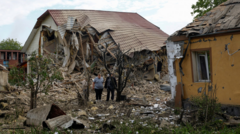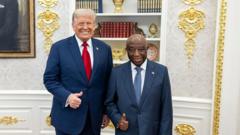On the eve of a scheduled call between U.S. President Donald Trump and Russian President Vladimir Putin, Ukraine has revealed that Russia launched its most extensive drone assault since the full-scale invasion began. Targeting multiple regions, including Kyiv, the attack resulted in one fatality and several injuries, marking an alarming uptick in hostilities just as diplomatic discussions commence.
Russia's Largest Drone Attack Yet Precedes Key Meeting with Trump and Putin

Russia's Largest Drone Attack Yet Precedes Key Meeting with Trump and Putin
In a significant escalation, Ukraine reports Russia has executed its largest drone strike since the onset of the war, coinciding with imminent high-profile diplomatic dialogues.
The Ukrainian air force stated that as of early Sunday, 273 drones were deployed across various Ukrainian territories, with Kyiv, Dnipro, and Donetsk being the primary focus. Reports reveal that Ukrainian defenses intercepted 88 drones; however, 128 drones were lost without inflicting damage. A notable aspect of this latest offensive is its timing, coming immediately after face-to-face negotiations between Ukraine and Russia that yielded a new prisoner exchange agreement but little progress towards peace.
Casualties from the drone strikes included the death of a woman in the Obukhiv district of Kyiv and injuries to at least three individuals, with a four-year-old child among those hurt. The Ukrainian leadership, including President Volodymyr Zelensky, condemned Russia's actions, stating they reflect a persistent intent to continue the war despite international calls for a ceasefire.
In conjunction with the escalating violence, key leaders from Germany, the UK, France, and Poland are set to convene virtually with Trump before his discussion with Putin. In light of the ongoing situation, they are expected to reiterate their support for a 30-day ceasefire initiative aimed at stabilizing the conflict.
Amid increasing tensions, reports from Ukraine's intelligence services suggest potential Russian preparations for a missile test launch, adding to fears of further military provocations. Russian forces have claimed the interception of 25 Ukrainian drones in their operations, although their broader military strategy remains clouded by recent developments.
As diplomatic channels are utilized to navigate this volatile period, all eyes will be on the outcome of the forthcoming dialogues, with Zelensky emphasizing a willingness for peace while reiterating that Ukraine will not concede to Russia's demands, which include neutral status and reduced military capabilities for Ukraine. These conditions were quickly rejected as unacceptable by Ukrainian officials, underscoring enduring divisions in the negotiating landscape.
The dynamics surrounding these latest events continue to shift, with heavy implications for future peace talks and international relations in the region.
Casualties from the drone strikes included the death of a woman in the Obukhiv district of Kyiv and injuries to at least three individuals, with a four-year-old child among those hurt. The Ukrainian leadership, including President Volodymyr Zelensky, condemned Russia's actions, stating they reflect a persistent intent to continue the war despite international calls for a ceasefire.
In conjunction with the escalating violence, key leaders from Germany, the UK, France, and Poland are set to convene virtually with Trump before his discussion with Putin. In light of the ongoing situation, they are expected to reiterate their support for a 30-day ceasefire initiative aimed at stabilizing the conflict.
Amid increasing tensions, reports from Ukraine's intelligence services suggest potential Russian preparations for a missile test launch, adding to fears of further military provocations. Russian forces have claimed the interception of 25 Ukrainian drones in their operations, although their broader military strategy remains clouded by recent developments.
As diplomatic channels are utilized to navigate this volatile period, all eyes will be on the outcome of the forthcoming dialogues, with Zelensky emphasizing a willingness for peace while reiterating that Ukraine will not concede to Russia's demands, which include neutral status and reduced military capabilities for Ukraine. These conditions were quickly rejected as unacceptable by Ukrainian officials, underscoring enduring divisions in the negotiating landscape.
The dynamics surrounding these latest events continue to shift, with heavy implications for future peace talks and international relations in the region.





















